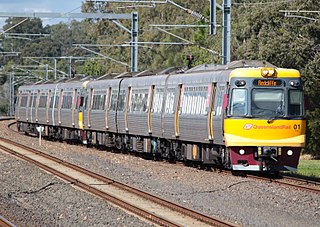
A bogie is a chassis or framework that carries a wheelset, attached to a vehicle—a modular subassembly of wheels and axles. Bogies take various forms in various modes of transport. A bogie may remain normally attached or be quickly detachable ; it may contain a suspension within it, or be solid and in turn be suspended ; it may be mounted on a swivel, as traditionally on a railway carriage or locomotive, additionally jointed and sprung, or held in place by other means.
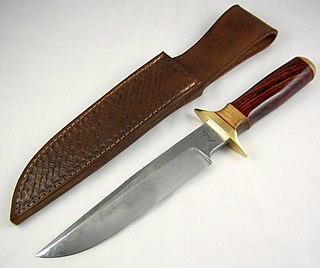
A knife is a tool with a cutting edge or blade attached to a handle. Mankind's first tool, knives were used at least two-and-a-half million years ago, as evidenced by the Oldowan tools. Originally made of rock, bone, flint, and obsidian, over the centuries, in step with improvements in metallurgy or manufacture, knife blades have been made from bronze, copper, iron, steel, ceramics, and titanium. Most modern knives have either fixed or folding blades; blade patterns and styles vary by maker and country of origin.
Jargon is specialized terminology used to define specific words and phrases used in a particular profession, trade, and/or group.
Terminology is the study of terms and their use. Terms are words and compound words or multi-word expressions that in specific contexts are given specific meanings—these may deviate from the meanings the same words have in other contexts and in everyday language. Terminology is a discipline that studies, among other things, the development of such terms and their interrelationships within a specialized domain. Terminology differs from lexicography, as it involves the study of concepts, conceptual systems and their labels (terms), whereas lexicography studies words and their meanings.
The yatagan or yataghan is a type of Ottoman knife or short sabre used from the mid-16th to late 19th centuries. The yatagan was extensively used in Ottoman Turkey and in areas under immediate Ottoman influence, such as the Balkans and the Caucasus.
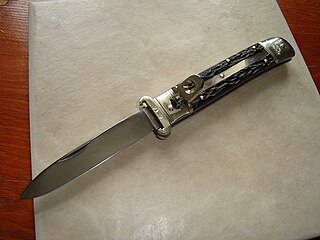
A switchblade is a type of knife with a folding or sliding blade contained in the handle which is opened automatically by a spring when a button, lever, or switch on the handle or bolster is stroked. Most switchblade designs incorporate a locking blade, in which the blade is locked against closure when the spring extends the blade to the fully opened position. The blade is unlocked by manually operating a mechanism that unlocks the blade and allows it to be folded and locked in the closed position.
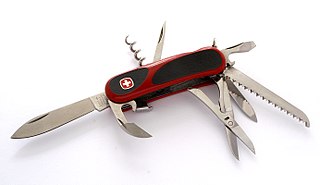
Wenger is one of two companies that have manufactured Swiss Army knives. Based in Delémont, Wenger was acquired by rival Victorinox in 2005. Since 2013, Wenger Swiss Army knives are integrated in the Victorinox collection ; the brand Wenger remains for watches and licensed products.

A fuller is a rounded or beveled longitudinal groove or slot along the flat side of a blade that is made using a blacksmithing tool called a spring swage or, like the groove, a fuller. A fuller is often used to lighten the blade. When combined with proper distal tapers, heat treatment and blade tempering, a fullered blade can be 20% to 35% lighter than a non-fullered blade without any sacrifice of strength or blade integrity. This effect lessens as the blade is reduced in length. A blade is said to be "fullered" after introduction of the groove.

Bedding, also known as bedclothes or bed linen, is the materials laid above the mattress of a bed for hygiene, warmth, protection of the mattress, and decorative effect. Bedding is the removable and washable portion of a human sleeping environment. Multiple sets of bedding for each bed will often be washed in rotation and/or changed seasonally to improve sleep comfort at varying room temperatures. In American English, the word bedding generally does not include the mattress, bed frame, or bed base, while in British English it does. In Australian, South African and New Zealand English, bedding is often called manchester.

The penny knife dates from the 18th century and was a very basic utility knife, originally with a fixed blade. It received the name penny knife for what it reportedly cost in England and America during the late 18th century: one penny. The famous Fuller's Penny Knife helped build the reputation of Sheffield, England, cutlers in the pre-industrial era of the early 18th century.
In cooking, a chef's knife, also known as a cook's knife, is a cutting tool used in food preparation. The chef's knife was originally designed primarily to slice and disjoint large cuts of beef. Today it is the primary general-utility knife for most western cooks.
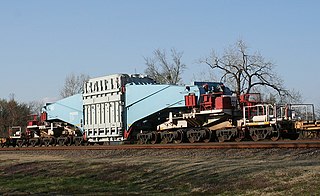
A Schnabel car or Schnabel wagon is a specialized type of railroad freight car. It is designed to carry heavy and oversized loads in such a way that the load makes up part of the car. The load is suspended between the two ends of the cars by lifting arms; the lifting arms are connected to an assembly of span bolsters that distribute the weight of the load and the lifting arm over a large number of wheels.
Wüsthof(also known as Wüsthof Dreizackwerk and Wüsthof Trident ) is a knife-maker based in Solingen, Germany. Family owned for seven generations, the company also sells kitchen shears, pocket knives and other cooking accessories, although on a smaller scale than its main competitor, Zwilling J. A. Henckels.

Alexander "Red" Webster was an American football fullback and halfback in the National Football League for the New York Giants. He was also the head coach of the Giants from 1969 to 1973.

A skeleton knife refers to two different types of knives, a kitchen knife and an unadorned penknife.
Cardboard is a generic term for heavy-duty paper-based products having greater thickness and superior durability or other specific mechanical attributes to paper; such as foldability, rigidity and impact resistance. The construction can range from a thick sheet known as paperboard to corrugated fiberboard which is made of multiple corrugated and flat layers.
Robert G. Terzuola is an American knife maker who popularized the type of knife known as the tactical folding knife.











